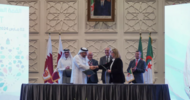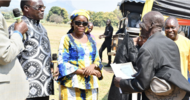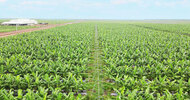L’augmentation du prix de la terre en Uruguay a conduit les entrepreneurs dans les secteurs de l’agriculture et de l’élevage à acheter des terres moins chères au Paraguay.
- AlterInfos
-
21 December 2018
Après quatre années à dénoncer les risques et les impacts négatifs effectifs de la Nouvelle alliance pour la sécurité alimentaire et la nutrition, l’annonce du retrait de la France est une réelle victoire. Mais il marque aussi l’échec de la France à transformer l’initiative et ne signifie pas encore que la NASAN soit définitivement terminée.
In 2011, three village communities in eastern-central Côte d’Ivoire learned that a Belgian corporation called SIAT was about to move onto their land without their consent.
- IDEF et al.
-
12 December 2017
Pension fund giant TIAA is investing its clients’ funds in farmland and agribusinesses tied to environmental and human rights abuses in Latin America.
The case is significant as it could change the way community displacement in the wake of large-scale land deals is tested and prosecuted
Global demand for agricultural land has increased 14-fold since the 2008 spike in global food prices. With that comes increasing cases of land grab, violence, and force eviction. Why every actor that could have prevent that is becoming increasingly powerless to do so.
- Foreign Policy
-
11 April 2016
Land grabs in the developing world create a system so unequal that resource-rich countries become resource dependent.
MIGA—the political risk insurance and credit enhancement arm of the World Bank Group—plays an important role in making agricultural FDI more effective by reducing investors’ perceived risks to encourage market entry while applying environmental and social performance standards that boost the project’s sustainability.
There are countless examples of governments handing it over at bargain prices to foreign investors, ranging from hedge funds to biofuel producers.
Can we minimize downsides and maximize benefits of transnational land investments?
Savills, the UK property consultancy, believes sub-Saharan Africa, in agriculture, is the Brazil of the 1970s but warns against investments in farms of over 5,000 ha because of land ownership sensitivities.
Transcription d'une table ronde organisée à Paris le 8 avril 2013 avec Stefano Liberti, Olivier de Schutter, Luc Lamprière et Anne-Cécile Robert
BRICS states, except Russia, are enhancing and facilitating land grabs abroad in a way that is inconsistent with their proclamations of sustainable development, cooperation solidarity, and respect of national sovereignty.
Alors que des achats de terres agricoles par des investisseurs étrangers, notamment asiatiques, ont pu émouvoir l'opinion publique ces dernières années, que représente ce phénomène en France et dans le monde ?
Land grabs in Canada have not been well-documented. Provinces do not keep inventory on large-scale land acquisitions. This blind eye approach has some people, particularly farmers, worried.
- Watershed Sentinel
-
07 Mar 2013
Today, more than a quarter of all the land in Liberia is leased or owned by logging, mining, or factory-style agriculture companies. Nothing is wrong with that — unless you happen to be one of the people who used to live on that land.
- Boston Globe
-
20 February 2013
Après le groupe Louis Dreyfus, le deuxième plus gros investisseur français dans les terres agricoles se nomme Vincent Bolloré.
Given the power imbalances at play, it is folly to assume that land-seekers will suddenly embrace, en masse, a set of voluntary rules promoting sustainable and equitable investor practices, says Michael Kugelman
- Sustainable Security
-
02 August 2012
Dalla Al Baraka, a Saudi conglomerate with $5 billion in annual revenue, has acquired two million acres of farmland in eastern Sudan to produce food for export to the Middle Eastern kingdom. While the investors are hoping to wean Saudi Arabia off imports from South America, such agreements cause concern among local Sudanese farmers.
Despite the African Union's commitment to strengthening women's access and control of land by placing land rights in the domain of human rights, it is silent on the issue of land grabs. This is a gap that the AU needs to plug.
- Open Democracy
-
10 February 2012
Ernesto Tzi, directeur de l’ONG guatémaltèque Sank, expose les enjeux autour de la terre dans son pays et les solutions qu’il développe pour protéger les agriculteurs.
- Le Monde
-
19 November 2010
Le Comité de la sécurité alimentaire (CSA) de l'Onu s'est contenté de "prendre note" d'un code de conduite sur les investissements fonciers à l'étranger, sans pour autant l'adopter, au grand dam d'ONG défendant les petits exploitants agricoles de pays en développement.
The UN Committee on Food Security has failed to endorse a code of conduct on foreign land investments, in a blow to efforts to draft international guidelines to regulate so-called "land grabs".
Over the past year, I have been collecting material on biofuels, land rights in Africa, and global land grabbing. Reading through this material worries me greatly, for it carries very strong echoes of Cecil Rhodes and his merry men.
It is not too late for equitable partnerships to flourish between foreign investors and local communities.
The Indonesian government is wise to learn from the South Korea Daewoo-Madagascar deal, which demonstrated the enormous economic, social and political risks associated with foreign ownership of land and water rights.
- CSR Asia
-
03 February 2010
A new breed of colonialism is rampaging across the world, with rich nations buying up the natural resources of developing countries that can ill afford to sell. Some staggering deals have already been done, but angry locals are now trying to stop the landgrabs
- The Independent
-
09 August 2009
Le G8 entend mettre un peu d'ordre et de principes dans la ruée mondiale sur les terres arables des pays du sud, à défaut de pouvoir s'immiscer dans les transactions qui privent les populations des terres dont elles dépendent.
Essentially, the Middle East is left with two choices. “The region has to import. The question is, invest abroad or rely on the free market?” said Dr Eckart Woertz, program manager in economics at the Gulf Research Center in Dubai.















